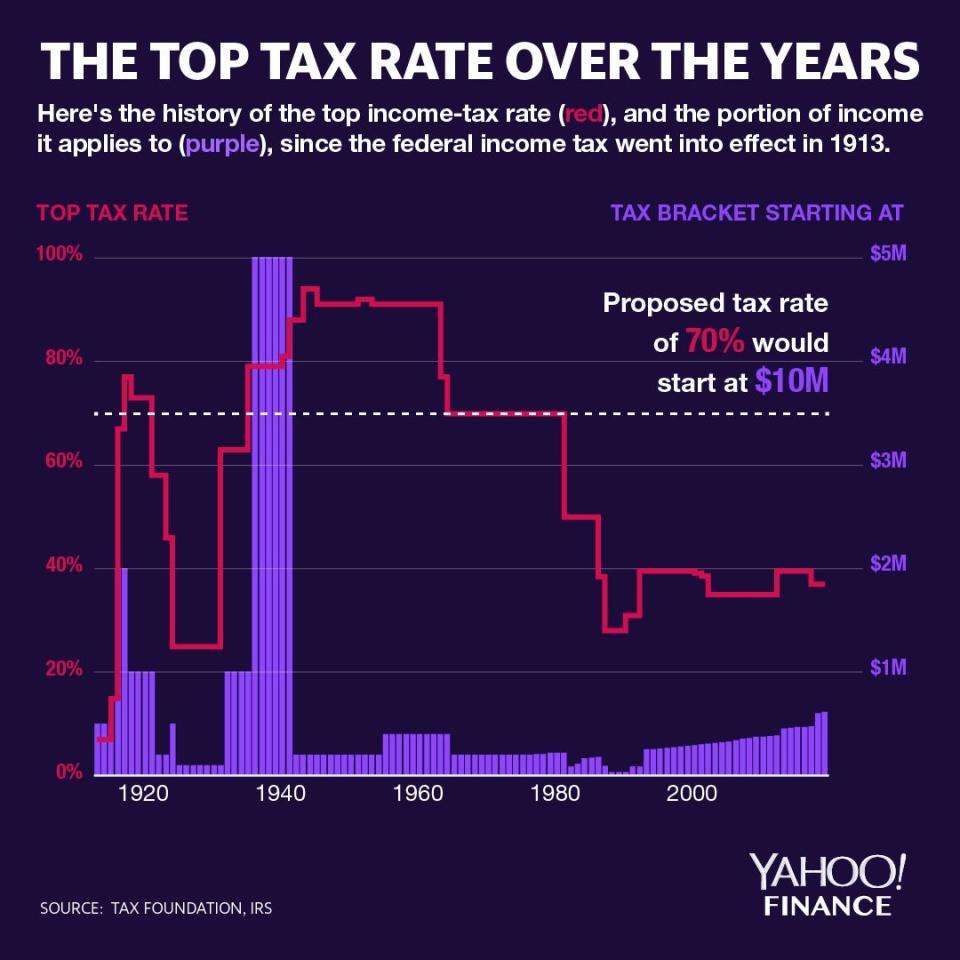Why we’ll never again have a 70% tax rate

If you’re a multimillionaire and you’ve heard the chatter about a new top tax rate of 70%, don’t worry—it’ll never happen.
The new Democratic Congresswoman Alexandria Ocasio-Cortez has triggered conservative aneurysms with a suggestion to hike the top tax rate to as high as 70%, in order to fund new environmentally friendly technology. AOC, as she’s known, points out correctly that tax rates have been that high before. In the 1970s, the top rate was 70%. Even in Ronald Reagan’s 1980s, the top rate was 50%. Today, it’s 37%.
But we’re not going back where we came from, for two reasons. First, trust in government has plunged. In 1958, 73% of Americans said they trusted the federal government to do the right thing most of the time. By 2017, that had fallen to 18%. That’s a gigantic change reflecting disgust with the Vietnam War, Watergate, political dysfunction, worsening income inequality and other types of perceived deterioration in American life. Confidence in the executive branch has dipped under President Trump, but growing distrust of government is a long-term trend that predates him.
If you don’t trust the government, you’re going to be more reluctant to hand over tax dollars than if you thought your money would be well-spent. Surveys show that a majority of Americans don’t trust Washington with their tax dollars, and voters think the government wastes about half of all the money it collects. Barring a national emergency that requires new funding, the voter and political pressure to substantially raise taxes isn’t there, even if it’s somebody else’s taxes.

The other problem is that government is bigger than it used to be. In 1960, government spending was 17.2% of GDP. This year, it’s around 21% of GDP. It was a bit higher than that in the 1980s, when the USSR was a competing superpower and Reagan was boosting defense spending. There’s no threat of that scale to U.S. interests now, yet the government spends nearly as much relative to the size of the economy because of the mushrooming cost of Medicare, Social Security and Medicaid. More tax revenue for new programs would push federal spending to record highs, at a time when citizens disdain their government and want less of it. Not gonna happen.
It’s still quite possible, however, that tax rates on the wealthy will rise somewhat. The top rate was 39.6% from 2013 to 2017, and the wealthy were hardly in a state of distress. The Trump tax cuts pushed the top rate down to 37%, starting in 2018. The cuts also pushed the income threshold for the top rate higher, from $470,701 to $600,001. That was a huge win for high earners. The top 5% of all earners will save more than $11,000 per year from the change, according to the Tax Policy Center, with the top 1% saving nearly $33,000.
Trump and some other Republicans said, paradoxically, that the tax cuts would generate more tax revenue, because they’d stimulate new economic activity subject to taxation. But federal tax receipts in fiscal 2018 rose by only 0.4%, even though the economy grew by around 3%. As a share of GDP, tax revenue declined. The annual federal deficit is likely to soar to $1 trillion this year, and stay there. At some point, Washington is going to have to pay down this debt, perhaps because borrowing will grow too high, or some sort of fiscal emergency develops.
At that point, taxes on the wealthy will be the first taxes to rise. Voters have already indicated they’re unhappy with the Trump tax cuts, which they feel favor businesses and the wealthy over ordinary workers. Democrats won the House of Representatives in the 2018 midterms in part as a repudiation of the tax cuts. They can’t raise taxes with Republicans controlling the Senate and the White House. But once there’s a need to raise taxes, the first step might be pushing the top rate back to 39.6%, where it was before Trump cut it. Going further than that is not what voters said they wanted in 2018, or are likely to say any time soon.
Confidential tip line: rickjnewman@yahoo.com. Click here to get Rick’s stories by email.
Read more:
How Elizabeth Warren wants to remake capitalism
The markets are telling Trump: Get your act together
Trump shows the perils of a businessman-president
Rick Newman is the author of four books, including “Rebounders: How Winners Pivot from Setback to Success.” Follow him on Twitter: @rickjnewman

